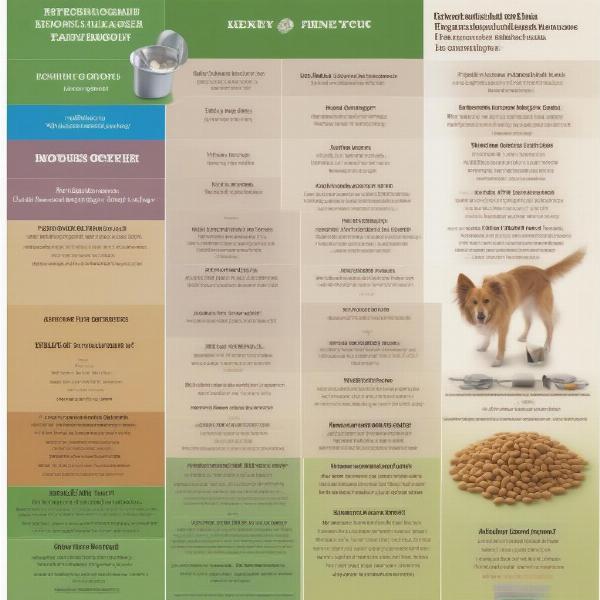Kidney disease in dogs can be a serious concern, but with the right diet, you can help manage the condition and improve your furry friend’s quality of life. Choosing the best kidney care dog food is crucial for supporting their kidney function and overall health. This guide will delve into the specifics of kidney care dog food, exploring its benefits, ingredients to look for, and how to choose the right one for your dog.
Understanding Kidney Disease in Dogs
Kidney disease, or chronic renal failure, occurs when a dog’s kidneys are no longer able to effectively filter waste products from the blood. This can lead to a buildup of toxins in the body, causing a variety of symptoms. Understanding the role of diet in managing this condition is crucial. Kidney care dog foods are specifically formulated to support kidney function by reducing the workload on the kidneys.
Key Ingredients in Kidney Care Dog Food
When choosing a kidney care dog food, look for these essential ingredients:
- Reduced Phosphorus: High phosphorus levels can exacerbate kidney problems. Look for foods with controlled phosphorus content.
- Controlled Protein: While protein is essential, too much can strain the kidneys. Kidney care diets often have moderate levels of high-quality protein.
- Low Sodium: Reducing sodium intake can help manage fluid buildup and blood pressure, which are common issues with kidney disease.
- Omega-3 Fatty Acids: These healthy fats have anti-inflammatory properties and can support kidney health.
- Antioxidants: Antioxidants can help protect kidney cells from further damage.
Choosing the Right Kidney Care Dog Food for Your Dog
Selecting the right food can feel overwhelming. Consider these factors:
- Your Vet’s Recommendation: Always consult with your veterinarian before switching your dog’s diet, especially for a medical condition like kidney disease. They can recommend the best food based on your dog’s specific needs.
- Dog’s Age and Breed: Some breeds are more prone to kidney issues. Your dog’s age also plays a role in their nutritional needs.
- Severity of Kidney Disease: The stage of kidney disease will influence the dietary restrictions required.
- Palatability: Ensure your dog enjoys the food, as getting them to eat is crucial, especially when they might have a reduced appetite due to illness.
 Comparison chart of kidney care dog foods
Comparison chart of kidney care dog foods
How to Transition to a Kidney Care Diet
Switching your dog’s food abruptly can cause digestive upset. Gradually introduce the new food over 7-10 days, mixing it with their old food in increasing proportions until they are fully transitioned.
Monitoring Your Dog’s Progress
Regular vet checkups are crucial to monitor your dog’s kidney function and adjust the diet as needed. Pay attention to your dog’s appetite, water intake, and overall energy levels.
Conclusion
Choosing the right kidney care dog food is a vital step in managing your dog’s kidney disease. By understanding the key ingredients and working closely with your veterinarian, you can provide your furry companion with the nutritional support they need to live a comfortable and fulfilling life. Remember, a proper diet is a cornerstone of managing kidney disease and can significantly impact your dog’s overall well-being.
FAQ
- What are the signs of kidney disease in dogs? Increased thirst and urination, lethargy, loss of appetite, and weight loss are common signs.
- Can kidney disease be cured? Unfortunately, there’s no cure, but with proper management, including diet, you can slow its progression and improve your dog’s quality of life.
- Are homemade kidney diets for dogs safe? It’s best to consult with a veterinary nutritionist before attempting a homemade diet, as ensuring nutritional balance is critical.
- How long can a dog live with kidney disease on a special diet? This varies depending on the severity of the disease and the individual dog, but a proper diet can significantly extend their lifespan and improve their comfort.
- Is dry or wet kidney care dog food better? Both can be suitable. Consult your vet for the best option based on your dog’s individual needs and preferences.
- What if my dog refuses to eat kidney care food? Try different brands or flavors, or warm the food slightly to enhance the aroma. Your vet can also offer suggestions.
- Besides diet, what else can I do to help my dog with kidney disease? Regular vet checkups, medication as prescribed, and ensuring access to fresh water are crucial.
Related Articles on ILM Dog
About ILM Dog
ILM Dog (ilmdog.com) is your trusted international resource for expert advice on dog care and nutrition. We offer a wealth of information on breeds, health, training, and feeding, equipping dog owners worldwide with the knowledge they need. Whether you’re navigating the challenges of kidney disease or simply seeking the best food for your beloved companion, ILM Dog offers reliable information and resources. For expert guidance on your dog’s specific needs, contact us at [email protected] or call us at +44 20-3965-8624.